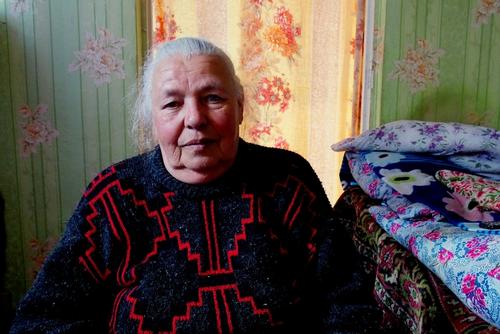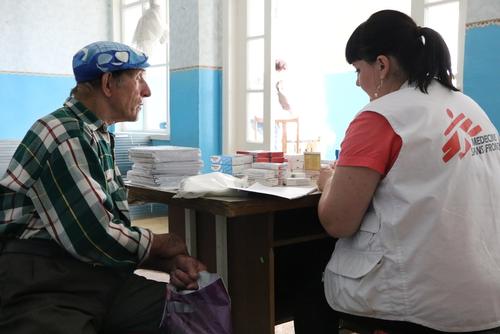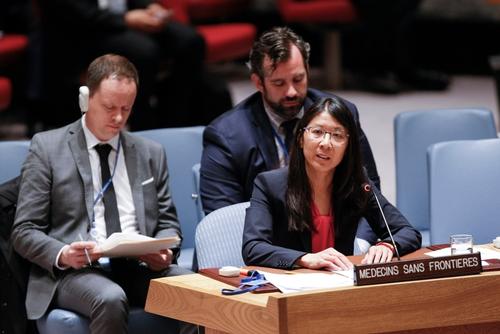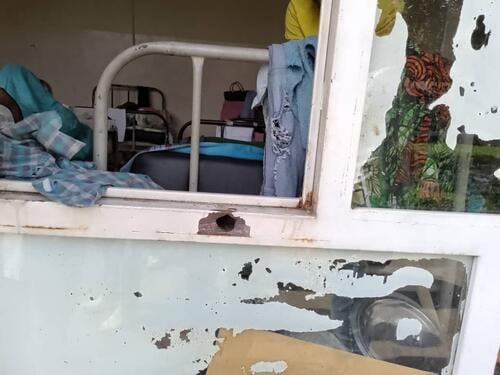It has been more than two years since conflict erupted in eastern Ukraine, yet thousands of forgotten victims remain left behind in areas close to the now unmoving line of contact. More than 9,300 people have been killed and some 21,500 injured since mid-April 2014
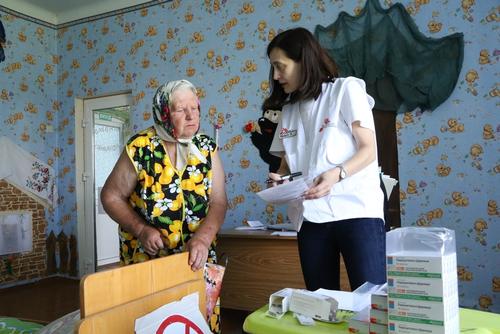
The protracted conflict has taken a heavy toll, especially on people who were unable to escape at the height of fighting and who are now left behind close to the line of contact where daily shelling is again the reality. Many elderly people remain stuck with little to no assistance, suffering with acute mental health needs and minimal access to essential healthcare for chronic diseases.
Médecins Sans Frontières (MSF) is currently one of the only international organisations providing much-needed direct medical and mental health assistance in areas close to the conflict. MSF teams based in Bakhmut and Mariupol are running mobile clinics and supplying facilities with drugs and equipment. They travel to around 40 locations to reach those most in need, operating clinics in empty schools, community buildings and abandoned health facilities. Some people have even opened up their homes to offer MSF doctors a location to provide care.
While operations at some health facilities are recovering in locations along the line of contact, medical staff still have not returned to some areas that are dangerously close to the ongoing conflict. Many clinics and hospitals remain without medications; others have been partially or completely destroyed.
Treatment for chronic diseases
The lack of treatment for chronic diseases such as diabetes and cardiovascular conditions is one of the major medical needs facing elderly people. In areas near the line of contact, MSF is working to fill gaps created by a severe lack of healthcare. In cities to which people have fled, such as Mariupol, high rates of unemployment and rampant inflation mean people living with such diseases simply cannot afford essential treatment. Without care, they are left with serious risk of medical complications.
Due to the high numbers of elderly patients, more than half of MSF’s patients present with cardiovascular disease. Diabetes is also common, with approximately one in ten patients on or requiring treatment.
Providing care for chronic diseases is a challenge, particularly in areas which are not always easy to reach due to insecurity. “It is essential that patients with chronic diseases have access to uninterrupted treatment,” says Dr Gabriela Das, MSF medical coordinator. “In order to avoid medical complications, if we cannot reach at-risk patients on a regular basis, we ensure that they have a ‘buffer’ amount of medication until the next consultation.”
It is estimated that more than one million of the 1.75 million people who are still displaced by the conflict are pensioners, most receiving the equivalent of just 42 euros per month. The monthly price of medication for chronic diseases costs an average of 14 euros – around one third of the pension – making treatment out of reach for many.
Raisa, 80 years old, is a pensioner living in Taramchuk, a small village close to the line of contact. In August 2014, her house was destroyed by shelling and she now lives in the house of a neighbour who fled the village when the conflict intensified. “We are lost here and very scared,” says Raisa. “Life here is terrible, and sometimes I have suicidal thoughts. I am in despair to find myself in this situation in my old age.”
Persistent psychological scars
Following two years of conflict, psychological trauma is pervasive, with families and communities torn apart. The elderly are particularly vulnerable, often left alone without emotional support after children and grandchildren fled to find safety in larger cities. Living with direct exposure to the conflict, anxiety and depression are commonplace.
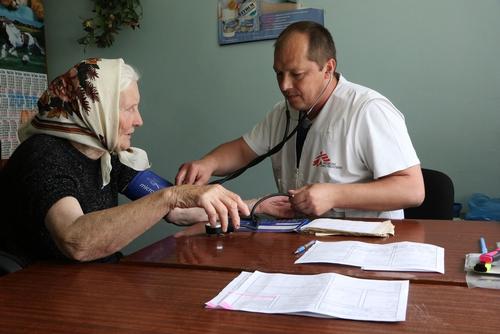
MSF began mental health support as part of its medical activities in July 2014 and has since conducted around 18,000 individual and group mental health consultations. A significant number of these consultations are for the elderly.
“With the elderly people we see, sometimes they are scared and they feel like they are going mad”, says Viktoria Brus, MSF psychologist in Kurakhove. “They start to forget things, and they keep silent and don’t say anything. We give them simple coping mechanisms, we reiterate their important role in the family and how they can do small things like talk to other people in the village to make themselves feel better.”
Anxiety affects more than half of MSF’s mental health patients. “Direct exposure to the conflict is one of the main reasons we see such high levels of anxiety,” says Dr Das. “The sense of hopelessness and uncertainty about the future contributes to this. Such stress can also contribute to exacerbating physical symptoms of other medical conditions. We often see this in patients with hypertension. Despite being under treatment they can also suffer difficult breathing, palpitations and sleeping problems because of the emotional stress. It’s therefore crucial that medical services are offered alongside psychological care to reduce the risk to the patient’s physical and mental health.”
No access to non-government controlled areas
Until October 2015, MSF was working on both sides of the frontline, providing assistance in government and non-government held areas. However, by October 2015, MSF’s authorisation to work in the self-proclaimed Lugansk and Donetsk People’s Republics (LPR and DPR) was withdrawn. Today, MSF teams are only able to work in areas controlled by the Ukrainian government. “When our teams had to leave LPR and DPR, we left behind thousands of patients in need,” says Mark Walsh, Head of Mission for MSF in Ukraine. “We are now especially concerned for those with illnesses such as diabetes, chronic kidney disease, cardiac disease and tuberculosis. In order to address the needs on both sides of this conflict, we still remain committed to resuming our activities in DPR and LPR when it is possible.”
After two years of providing much needed medical and humanitarian assistance to people affected by the conflict in Bakhmut and surrounding areas, MSF will conclude its activities by the end of July 2016. Several of MSF’s activities in that location will be handed over to other NGOs, together with equipment and supplies to continue providing assistance for the coming few months. However, MSF teams continue to run mobile clinics in Mariupol and the surrounding areas.
In 2015, MSF donated medicines and medical equipment to more than 350 health facilities on both sides of the frontline, enabling over 9,900 patients with conflict-related injuries and more than 61,000 with chronic diseases to be treated, and 5,100 women to have assisted deliveries. Teams also carried out around 159,900 basic healthcare consultations and 12,000 mental health consultations in cooperation with the Ministry of Health. MSF teams also ran first aid and water points to assist people waiting in long queues in the summer heat who want to cross the frontline at the Novotroitske, Zaitseve and Mayorsk checkpoints.



